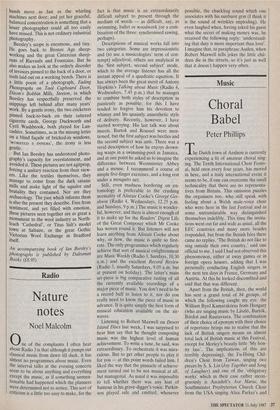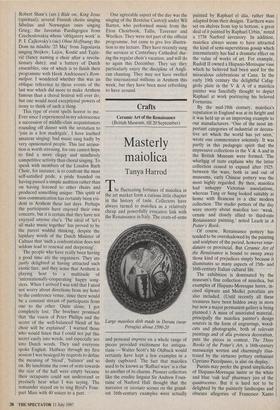Music
Choral Babel
Peter Phillips
he Dutch town of Arnhem is currently experiencing a fit of amateur choral sing- ing. The Tenth International Choir Festiv- al, held once every four years, has moved in here, and a truly international event it seems to be, if one can overcome the small technicality that there are no representa- tives from Britain. This omission puzzles the organisers too, who still speak with feeling about a Welsh male-voice choir who were here in the last Festival and in some untranslatable way distinguished themselves indelibly. This time the invita- tions went out far and wide as usual, all the EEC countries and many more besides responded, but from the British Isles there came no replies. 'The British do not like to sing outside their own country,' said one official to me. I said 1 had not observed this phenomenon, either at away games or in foreign opera houses, adding that I was personally conducting English singers in the next ten days in France, Germany and Austria. At this he looked discomfited and said that that was different.
Apart from the British, then, the world has sent a grand total of 84 groups, of which the following caught my eye: the William Byrd Kamarakorus from Hungary (who are singing music by Lasz16, Barn* Bardog and Rautavaara. The combination of their choice of eponym with their choice of repertoire brings me to realise that the lack of British singers means an almost total lack of British music at this Festival, except for Morley's beastly little 'My bon- ny lass'. The implications of this are terribly depressing); the Fu-Hsing Chil- dren's Choir from Taiwan, singing two pieces by S. S. Lin (Joy Together and Song of Laughter) and one of the 'obligatory works' which in their case rather incon- gruously is Arcadelt's Ave Maria; the Southminster Presbyterian Church Choir from the USA singing Alice Parker's and
Robert Shaw's (arr.) Ride on, King Jesus (spiritual); several Finnish choirs singing Sibelius and Norwegian ones singing Grieg; the Juventus Paedagogica from Czechoslovakia whose 'obligatory work' is P. I. Cajkovsky's (sic) Ohne Hoffnung; the Dom na mladite '25 Maj' from Jugoslavia singing Stojkov, Lajos, Kostid and Tajde- vid (fancy naming a choir after a revolu- tionary date); and a battery of Dutch ensembles, one of which is to finish their programme with Henk Andriessen's Rom- melpot. I wondered whether this was an oblique reference to those events of the last war which did more to make Arnhem famous than a choral festival will ever do; but one would need exceptional powers of irony to think of such a thing.
This type of event spells horror to me. Ever since I experienced in my adolescence a succession of middle-class acquaintances rounding off dinner with the invitation to 'join in a few madrigals', I have loathed amateur singing: bad music sung badly by very opinionated people. This last accusa- tion is worth stressing, for one cannot hope to find a more cliquy and mindlessly competitive activity than choral singing. To speak with members of the London Bach Choir, for instance, is to confront the most self-satisfied pride, a pride founded on having passed a simple audition rather than on having listened to other choirs and produced something unique. This spirit of non-communication has certainly been evi- dent in Arnhem these last days. Perhaps the participants have enjoyed their own concerts, but it is certain that they have not enjoyed anyone else's. The ideal of 'let's all make music together' has proved to be the purest wishful thinking, despite the lapidary words of the Dutch Minister of Culture that `such a confrontation does not seldom lead to renewal and deepening'.
The people who have really been having a good time are the organisers. They are justly delighted at having attracted such exotic fare, and they sense that Arnhem is playing host to a multitude of 'internationally-cooperating' happy song- sters. When I arrived I was told that I need not worry about directions from my hotel to the conference venue, since there would be a constant stream of participants from one to the other. Quite alone, I got completely lost. The brochure promised that 'the vision of Peter Phillips and the secret of the well-balanced blend of his choir will be explained'. I warned those who would listen that I could not put this secret easily into words, and especially not into Dutch words. They said everyone spoke English. Halfway through my first session I was besieged by requests to define the meaning of 'blend', 'balance' and so on. By lunchtime the rows of seats towards the rear of the hall were empty because their occupants could not understand or precisely hear what I was saying. The remainder stayed on to sing Byrd's Four- part Mass with 40 voices to a part. One agreeable aspect of the day was the singing of the Boxtelse Cantorji under Wil Barten, who performed music from the Eton Choirbook, Tallis, Taverner and Weelkes. They were not part of the official programme, but came to give live illustra- tion to my lecture. They have recently sung the services at Canterbury Cathedral dur- ing the regular choir's vacation, and will do so again this December. They say they particularly enjoy the discipline of Angli- can chanting. They may not have swelled the international millions in Arnhem this week, but they have been most refreshing to have around.



















































 Previous page
Previous page